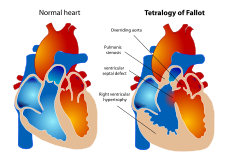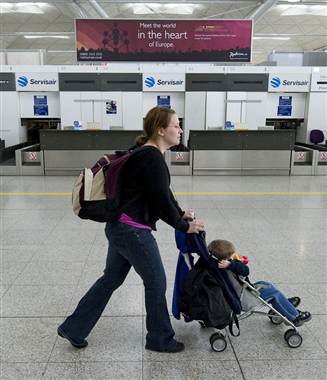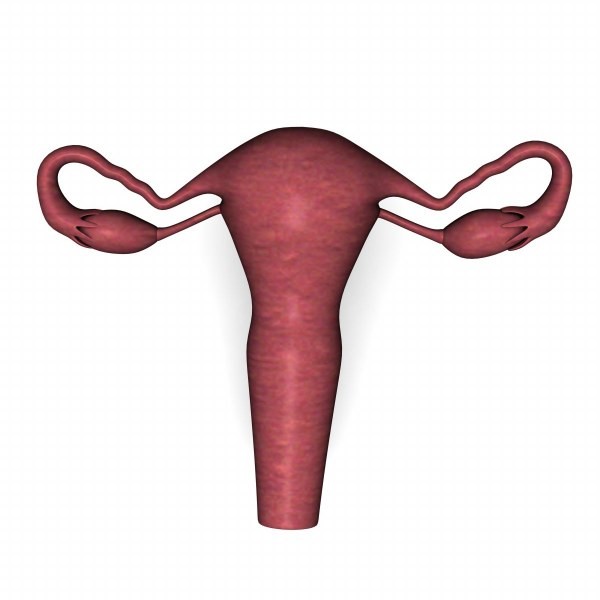
Category Archives: Baby


Baby developmental milestones Part 1
Babies grow in such unique ways: The baby who sits up weeks before her peers might be one of the last to learn how to crawl. Or the 18-month-old who’s still communicating with grunts and gestures suddenly bursts forth with prepositional phrases at 2 years. That’s why we created this series of charts. Continue reading

Tetralogy of Fallot
Tetralogy of Fallot is a type of congenital heart defect. Congenital means that it is present at birth.
Causes, incidence, and risk factors
Tetralogy of Fallot causes low oxygen levels in the blood. This leads to cyanosis (a bluish-purple color to the skin).
The classic form includes four defects of the heart and its major blood vessels: Continue reading

Air travel tips with infants
The idea of flying with kids is probably the biggest single cause of stress for traveling parents. Nobody looks forward to lugging a lot of luggage through the airport with a tired and unhappy child (or children) in tow, and the prospect of keeping them seated, quiet, and happy for hours on end can be terrifying. While we can’t promise that your kids won’t have a melt down, our travel tips will help streamline your air travel and keep everyone in a better mood! We also have helpful advice for making travel with infants easier. Continue reading

What To Expect After A Hysterectomy
Hysterectomy comes from the word “hystera†which means “uterusâ€â€”the body part that symbolizes womanhood. We often see the word, hystera combined with other suffixes indicating to words related to the uterus. The main function of the uterus is to accept the fertilized ovum to be implanted on its walls to be nurtured. The uterus becomes the home of the fetus, nourishing and protecting the baby all throughout pregnancy. This function makes the uterus a very important body part to women. We all know that men are women are alike except on the physical attributes. Only women have uterus and only women can bear a child. Continue reading

Two Types of Stress Experienced by Children
We are worried about so many things—work, finances, health problems, etc. But do you know that even children experienced stress? Not only adults become stressed about our worldly problems and activities. Children experiences stress and are more susceptible to a lot of forms of stress due to their age. Many people think that children are never stressed and only love to have fun and play but the truth is that even children become worried about many things and also become physically stressed in school and play. Continue reading

Baby Fever Due to Teething: An Urban Legend?
Your infant baby suddenly became fuzzy, seems to be all red in the face and cannot sleep. He seems restless and drools a lot. The first thing you did was to touch your baby and you found out that he seems a bit hot than the usual. “Oh no! My baby is having a fever!†You scream to yourself. Continue reading

Urinary Tract Infections in Children
The urinary system is also known as the excretory system. The urinary system is consisted of two kidneys, two ureters, the urinary bladder and the urethra. The function of the urinary system is to produce, store and excrete urine and waste products from the body Continue reading

Neuromins: A Clear Focus
Neuromins is a brand of supplement that is derived from a vegetable source that is rich in DHA (docosahexaenoic acid). DHA is one of the omega-3 fatty acids that are essential for your health. The common source of DHA is fish oil. This makes Neuromins very unique because this DHA comes from microalgae extracts. The microalgae if what the fishes actually eat so taking Neuromins is like going straight to the source of the known source.

37 Week Fetus and Pregnancy
Congratulations! Oh mother, your baby is now considered a full term baby, even though your due date is three weeks away.  Only five percent of babies are born on their due date. Most babies won’t be coming for three to five more weeks for first time mothers but if your baby decides to come out now, his lungs will most likely be ready to breathe on his own outside the womb. The baby has already passed the 6th month of gestation wherein the lungs become mature enough to produce surfactant—the fluid that prevents tension in the lungs. The baby is now very much welcome to the world. Hush, because the baby may be ready to come out anytime soon. A little patience will do the trick. Continue reading